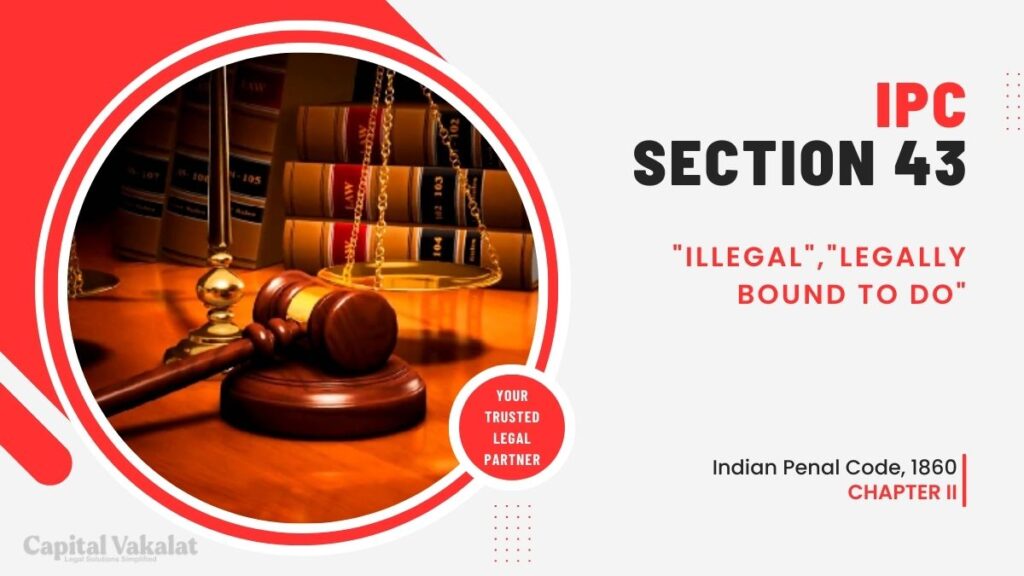In the realm of the Indian Penal Code (IPC), Section 43 occupies a significant place, delving into the complex interplay between actions that are deemed “illegal” and situations where individuals are “legally bound to do” certain things.

This article delves into the depths of Section 43 IPC, shedding light on its implications, exceptions, and real-world applications.
Introduction to Section 43 IPC
Section 43 of the Indian Penal Code (IPC) pertains to situations where an individual, though committing an act that might be generally construed as “illegal,” is nonetheless shielded by the principle of being “legally bound to do” that action. This section recognizes that there can be instances where legality takes precedence over the apparent unlawfulness.
Understanding “Illegal” Actions
In the eyes of the law, actions can often be categorized as “illegal” due to their contravention of established norms, regulations, or statutes. However, the legal landscape is not always black and white, leading us to explore the concept of “illegal” in a nuanced manner.
The Concept of Being “Legally Bound to Do”
Section 43 delves into the intricacies of situations where individuals are obligated by law to perform certain actions that might otherwise seem to be against the law. This dimension raises questions about the clash between legal duties and common perceptions of legality.
Navigating the Thin Line: Examples and Case Studies
To comprehend the complexities of Section 43 IPC, we delve into real-world examples where individuals have found themselves walking the tightrope between committing an “illegal” act and being “legally bound to do” it. Case studies provide insights into the practical application of this legal doctrine.
Exceptions and Limitations of Section 43 IPC
Like any legal principle, Section 43 IPC has its exceptions and limitations. These carve out scenarios where the principle of being “legally bound to do” might not apply, shedding light on the boundaries of this legal provision.
Impact on Various Legal Spheres
Section 43 IPC ripples through various legal domains, including contract law, employment law, and public administration. Understanding its implications in these spheres is essential for comprehending its wider impact.
Ensuring Compliance: Legal and Ethical Considerations
The interplay between “illegal” actions and being “legally bound to do” raises ethical questions. We explore how individuals and organizations can ensure compliance with the law while upholding ethical standards.
The Role of Intent and Knowledge
Intent and knowledge often play a crucial role in determining whether an action is “illegal” or if an individual is “legally bound to do” it. This section examines how the presence of intent can influence legal outcomes.
Section 43 IPC in the Digital Age
As our world becomes increasingly digitized, Section 43 IPC faces new challenges and applications in the digital realm. We explore how this section intersects with cyber law and online activities.
Balancing Act: Protecting Rights While Obliged to Act
Section 43 IPC brings forth the delicate balance between individual rights and legal obligations. We discuss instances where individuals are forced to compromise their rights for the greater good.
Recent Developments and Amendments
The legal landscape is ever-evolving, and Section 43 IPC is no exception. We examine recent developments, amendments, and judicial interpretations that have shaped its current understanding.
Challenges in Implementation and Enforcement
Implementing and enforcing Section 43 IPC is not without hurdles. This section delves into the challenges that law enforcement agencies, legal professionals, and individuals face in ensuring its effective application.
Clarifications from the Judiciary
Over time, the judiciary has provided clarifications that have refined the application of Section 43 IPC. We explore landmark judgments and their impact on the understanding of this legal provision.
Public Awareness and Education
Raising public awareness about Section 43 IPC is crucial for ensuring that individuals understand their legal obligations and rights. We discuss the role of education in preventing misunderstandings.
Conclusion
In a world where legality and obligations often intersect, Section 43 IPC stands as a testament to the complexity of the legal system. Navigating the thin line between “illegal” actions and being “legally bound to do” requires a deep understanding of the law, ethics, and societal contexts.
Certainly, here are some external resources that provide further details on the topic of “Section 43 IPC: Illegal Acts and Legal Obligations”:
- Indian Penal Code – Section 43 – Read the exact text of Section 43 of the Indian Penal Code and its interpretations.
- Legal Explanations of IPC Sections – A forum thread discussing various IPC sections, including explanations and case examples.
- Understanding Legal Obligations – A PDF document that explains legal obligations in different contexts, helping to contextualize Section 43 IPC.
- Digital Age Challenges to IPC – A video discussing the challenges and nuances of applying Section 43 IPC in the digital age.
Please note that while these resources provide valuable insights, it’s important to cross-reference information and ensure it aligns with the latest legal developments and interpretations.
FAQs
How does intent play a role in this section?
Intent is a crucial factor in determining whether an action is “illegal” or if an individual is “legally bound to do” it. It can influence legal outcomes significantly.
What are some examples of scenarios covered by Section 43 IPC?
Examples include cases where individuals are required by law to breach contracts, disclose confidential information, or perform actions that might seem illegal.
How does Section 43 IPC impact digital activities?
In the digital age, Section 43 IPC intersects with cyber law, especially concerning online activities where individuals might be obliged to disclose information or take specific actions.
Why is public awareness important for Section 43 IPC?
Public awareness is vital to prevent misunderstandings and ensure individuals comprehend their legal obligations and rights under this section.